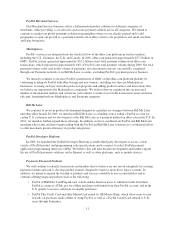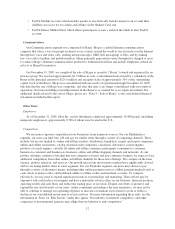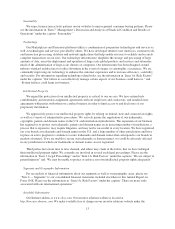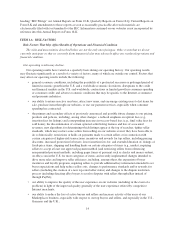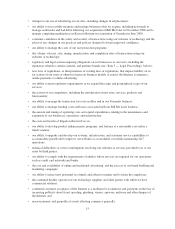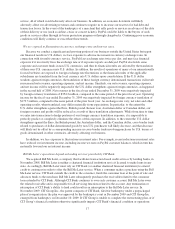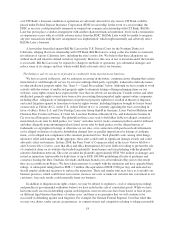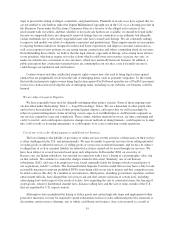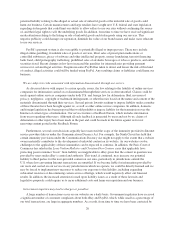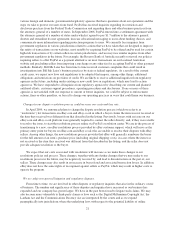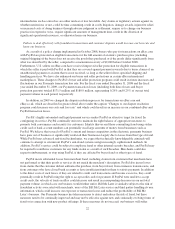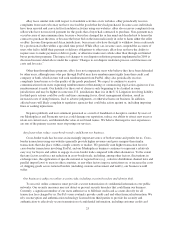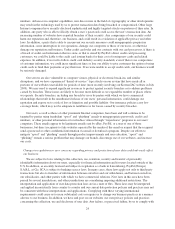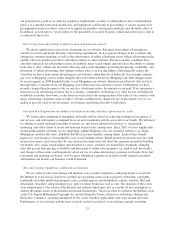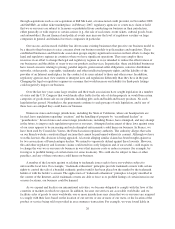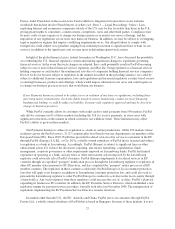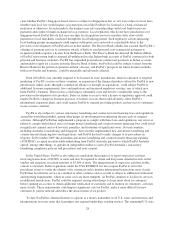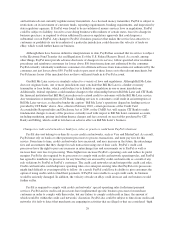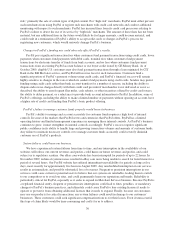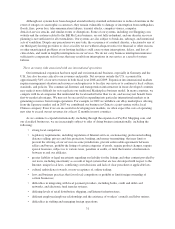eBay 2009 Annual Report Download - page 29
Download and view the complete annual report
Please find page 29 of the 2009 eBay annual report below. You can navigate through the pages in the report by either clicking on the pages listed below, or by using the keyword search tool below to find specific information within the annual report.various foreign and domestic governmental regulatory agencies that have questions about our operations and the
steps we take to protect our users from fraud. PayPal has received inquiries regarding its restriction and
disclosure practices from the Federal Trade Commission and regarding these and other business practices from
the attorneys general of a number of states. In September 2006, PayPal entered into a settlement agreement with
the attorneys general of a number of states under which it agreed to pay $1.7 million to the attorneys general,
shorten and streamline its user agreement, increase educational messaging to users about funding choices, and
communicate more information regarding protection programs to users. We currently face inquiries from
government regulators in various jurisdictions related to actions that we have taken that are designed to improve
the safety of transactions on our websites, most notably by requiring PayPal to be offered and/or used for certain
high-risk transactions or by certain sellers in certain jurisdictions, and we may face similar inquires from other
government regulators in the future. For example, the Reserve Bank of Australia recently reviewed our policies
requiring sellers to offer PayPal as a payment alternative on most transactions on our localized Australian
website and precluding sellers from imposing a surcharge or any other fee for accepting PayPal or other payment
methods. Similarly, Bill Me Later has from time to time received customer complaints that could result in
investigations into Bill Me Later’s business practices by state or federal regulators. As a result of the current
credit crisis, we expect new laws and regulations to be adopted that impose, among other things, additional
obligations and restrictions on providers of credit. We are likely to receive additional inquiries from regulatory
agencies in the future, including under existing or new credit laws or regulations, which may lead to action
against us. We have responded to all inquiries from regulatory agencies by describing our current and planned
antifraud efforts, customer support procedures, operating procedures and disclosures. If one or more of these
agencies is not satisfied with our response to current or future inquiries, we could be subject to enforcement
actions, fines or other penalties, or forced to change our operating practices in ways that could harm our business.
Changes to our dispute resolution process could increase our costs and loss rate.
In April 2009, we announced plans to change the dispute resolution process (which we refer to as
“resolutions”) for transactions on eBay.com and eBay.co.uk in which a buyer claims the item was not received or
the item they received was different from that described in the listing. Previously, buyers with an issue on our
eBay.com and eBay.co.uk platform were generally required to contact the seller directly, and, if they were unable
to resolve the issue, to start the resolutions process online via PayPal’s resolution center. We are in the process of
transitioning to a new, on-eBay resolutions process provided by eBay customer support, which will serve as the
primary entry point for buyers on eBay.com and eBay.co.uk who are unable to resolve their disputes with eBay
sellers. Among other things, the new resolutions process provides that eBay will generally reimburse the buyer
for the full amount of an item’s purchase price (including original shipping costs), in cases where the item was
not received or the item they received was different from that described in the listing, and the seller does not
provide adequate resolution to the buyer.
We expect that our costs associated with resolutions will increase as we make these changes to our
resolutions policies and process. These changes, together with any further changes that we may make to our
resolutions process in the future, may be negatively received by, and lead to dissatisfaction on the part of, our
sellers. These changes may also result in an increase in buyer fraud and associated transaction losses. In addition,
eBay does not have the same rights of recoupment against sellers as PayPal, which may result in higher costs to
operate the program.
We are subject to general litigation and regulatory disputes.
From time to time, we are involved in other disputes or regulatory inquiries that arise in the ordinary course
of business. The number and significance of these disputes and inquiries have increased as our business has
expanded and our company has grown larger. We have in the past been forced to litigate such claims. We may
also become more vulnerable to third-party claims as laws such as the Digital Millennium Copyright Act, the
Lanham Act and the Communications Decency Act are interpreted by the courts and as we expand
geographically into jurisdictions where the underlying laws with respect to the potential liability of online
21


